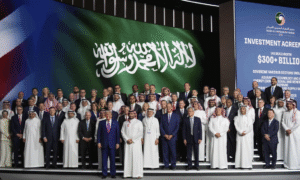Nvidia and AMD have agreed to give 15% of their revenue from advanced chip sales to China to the U.S. government as part of a deal that allows them to resume exports. This arrangement follows a prior ban imposed by the Trump administration in April, citing national security concerns over the sale of high-end semiconductors.
The sales, which include Nvidia’s H20 and AMD’s MI308 chips—both used for artificial intelligence development—had been suspended due to those security concerns. However, in July, both companies revealed they had received permission to restart exports, though the terms of that decision were not fully disclosed until now.
President Donald Trump confirmed the revenue-sharing agreement in a Monday press conference, explaining that the deal resulted from negotiations with Nvidia CEO Jensen Huang. Trump said he initially pushed for a 20% revenue share, but settled at 15% after discussions. “So we negotiated a little deal. He’s selling a basically old chip,” Trump said, referring to the H20 model.
While Nvidia declined to comment on the specifics of the deal or its quid pro quo implications, the company said it would comply with the export rules established by the U.S. government. In a statement, Nvidia emphasized the importance of maintaining U.S. leadership in technology, particularly in artificial intelligence.
“We follow the export regulations set by the U.S. government and aim to stay competitive in global markets. Though we haven’t shipped H20 chips to China recently, we hope future policy allows America to maintain its technological leadership. We cannot afford to repeat what happened with 5G,” the company stated.
The deal has drawn sharp criticism from lawmakers. Representative Raja Krishnamoorthi, the top Democrat on the House Select Committee on China, questioned both the legality and strategic wisdom of the arrangement. He expressed concern that the revenue-sharing deal may blur the lines between national security measures and financial incentives.
“Our export controls should be driven by genuine security concerns, not used as backdoor taxation methods,” Krishnamoorthi said. “Export restrictions aren’t negotiation tools or revenue generators. We shouldn’t jeopardize national security just to raise money.”
Some policy experts also questioned the constitutionality and sustainability of the agreement. Derek Scissors, a senior fellow at the American Enterprise Institute, pointed out that the 15% revenue share closely resembles a tax, which could run afoul of constitutional limits on export taxation.
“There’s no precedent for this kind of deal,” Scissors said. “They may call it a fee, but it looks and functions just like a tax. That’s why I doubt this kind of arrangement will last. If it does, we’re either setting a precedent for an export tax on high-profile goods or we’re risking national security in exchange for revenue—essentially the same as slashing the defense budget.”
In July, Nvidia warned that stringent export controls could cost the company as much as $5.5 billion in lost revenue. Company executives argued that restricting access to the massive Chinese market would hurt U.S. competitiveness in the global AI sector. They also cautioned that other countries might turn to Chinese-developed AI technology if U.S. firms are limited in their ability to sell overseas.
Commerce Secretary Howard Lutnick previously told CNBC that the resumption of Nvidia’s chip exports was part of a broader trade negotiation between the U.S. and China, involving rare earth magnets—a critical component in electronics and defense.
The debate over chip sales to China remains central to the broader technology competition between the U.S. and China. Supporters of export controls believe they are essential to slowing down China’s technological advances, giving U.S. companies room to stay ahead. Critics, however, argue that such restrictions could encourage China to develop its own solutions faster—potentially undermining the goals of the restrictions.
One example that reignited this debate was the launch of China’s DeepSeek AI chatbot in January, which raised new concerns about how advanced computing power could fuel China’s ambitions in artificial intelligence.
Also Read:
Nvidia Becomes First Public Company to Hit $4 Trillion Market Value
U.S. Stocks Hover Near Record Highs as Wall Street Awaits Inflation Report














